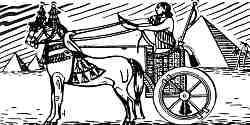 But the principle of the wheel has served man in other
ways besides transportation. Centuries ago men learned to add teeth and
called them gears thereby discovering a new means of transmitting power
and increasing leverage. He put them in watches and clocks and later
these gears made the gasoline automobile and thousands of otherthings
possible.
But the principle of the wheel has served man in other
ways besides transportation. Centuries ago men learned to add teeth and
called them gears thereby discovering a new means of transmitting power
and increasing leverage. He put them in watches and clocks and later
these gears made the gasoline automobile and thousands of otherthings
possible. Practically all land transportation and many of our every day jobs are made possible by the use of wheeled devices. Our factories are mazes of rotating pulleys and belts as they produce weapons for our armies - the turning wheel is the symbol of the mechanical age. It may seem a far cry from the rolling log of our prehistoric ancestors to the tremendous rubber tired wheels of a B-29 bomber, but the principle is the same. Dunlop, with the pneumatic tire, and hundreds of other men have contributed in many ways to its development, and it is interesting to note that even today many constructive inventions are being made to improve this simple device. |








